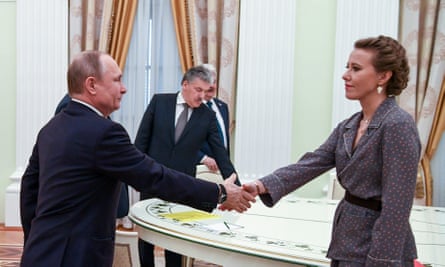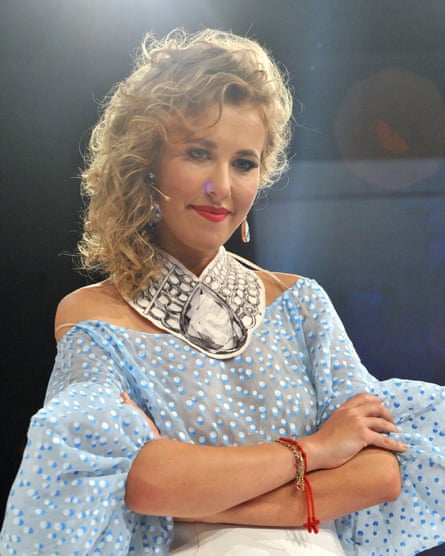Say what you like about Ksenia Sobchak – and in Russia they say a lot of things – but she knows how to work a crowd. Talking to a packed room at Pushkin House, a venue for Russian cultural events in London, she starts with a joke. And not a bad one: “You know, in Russia we say there are three things you can’t choose: your parents, your gender and your president.”
Sobchak should know. In March’s Russian presidential election, she was one of seven challengers to Vladimir Putin, and only the third woman to stand for president in the country. (Ella Pamfilova in 2000 and Irina Khakamada in 2004 were the others.) She got 1.6% of the vote. In a climate where Russia-UK relations have hardly ever been worse, her visit to London seems designed to raise as many questions as it answers. What is next for her politically? (Unclear – it was a resounding defeat.) Is there any hope for liberalism or opposition of any kind in Russia? (This has yet to be seen.) And will Putin attempt to extend his term beyond the next six years? (Probably not, but you never know.)
We meet before her sold-out appearance at Pushkin House. The night before, she had been at a debate hosted by Andrew Neil (whose Scottish accent she struggled to decipher) for the Spectator magazine. She is flustered, tired and has a cold, but as soon as she is asked a question, she relaxes and segues into politician mode – and you remember that she has been watching people do this kind of thing since she was a child. Her father, Anatoly Sobchak, was mayor of St Petersburg from 1991 to 1996.
How did it feel to get 1.6% of the vote in an election where the winner got 76.6%? (Putin’s nearest challenger was Pavel Grudinin, the Communist candidate, with 11.8%.) “I was disappointed with the result, of course,” she says. “I expected more. I was less disappointed with my own result, though, than with Putin’s numbers. It’s a huge problem, 76%.” The scale of this result is unprecedented and represents a huge challenge for any liberal opposition, she says. “The opposition was fragmented because of the boycott. But to get such a low result … I was unhappy.”
Russia’s most prominent opposition candidate is Alexei Navalny, who called upon those opposed to Putin to boycott the elections entirely. This is where Sobchak’s candidacy becomes hard to fathom. She paints herself as someone who loves politics, wants change for her country and is in a position to run. Her platform includes speaking out about political prisoners and championing human rights activists. But if she is a true liberal, why take part in the pantomime at all? There are many competing views within Russia about her decision to run: that she is being used – wittingly or otherwise – to discredit the liberal opposition; that she is a stooge and a scapegoat; that she’s a pawn in Putin’s game; that it’s all a big extension of a reality show, much like the ones she fronted on Russian television for years.

Between 2004 and 2012, Sobchak was the host of Dom 2, Russia’s version of Big Brother, and presented numerous other TV programmes. She was also in films and made a rap video. Despite turning her back on all this to follow a political path, it hasn’t stopped most of the coverage in Russia and abroad referring to her as “the ex-Playboy model dubbed ‘Russia’s Paris Hilton’.” While that description isn’t entirely inaccurate, it doesn’t really reflect who she is: a complex hybrid of perestroika royalty, modern Russian celebrity and elite liberalism.
Whose side is she on, though? As the polls closed last month, Sobchak was engaged in an argument live on television with Navalny, who was barred from standing for election because of a suspended prison sentence for fraud. (Navalny had argued that only those in prison are barred from running, but the ban was upheld.) Navalny accused Sobchak of accepting cash to run and claimed she was an “instrument” of Putin: “You have become the champion of hypocrisy.” He added, as she sat opposite, shaking her head: “You came to me at two in the morning a month before you announced your candidacy and you said, sitting in my kitchen, drinking tea: ‘They’re offering me a lot of money. I don’t know what to do.’” She replied on air: “That’s not true and you know it. You’re lying.”
A month on, she says this episode reflects worse on Navalny. “I think Navalny has put himself in an extremely uncomfortable position,” she says. “It’s ridiculous nonsense. But let’s say what he says is true. Why didn’t he say something immediately after this supposed conversation with me? If it’s true, then he concealed life-changing information for half a year at a time when the country was holding elections.” It’s a fair point. But, as always with Russian politics (or, to be fair, politics anywhere), someone is concealing their agenda and it is not clear who.
Her TV appearances in Russia during the electoral campaign did the most to convince me that there must be something genuine about her. On one live broadcast after another, she was hounded, harangued, ridiculed and humiliated. She generally managed to maintain her composure in the face of appalling rudeness and bullying by making succinct, clear points and rarely losing her temper. I’m not sure anyone could keep this up as an act. On one television programme, surrounded by five male candidates, Sobchak came under a barrage of abuse and was interrupted so constantly that she could barely be heard. “These people interrupt me and only me,” she could be heard shouting above the cacophony in a clip. “They do not interrupt each other. One of them just called me a [bleep] witch … Give me the time I am allowed. You thought up this format. I want my time.” Although everyone was talking over each other and it was not clear who was saying what, you could hear the words: “Go back to kindergarten, little girl,” and: “Why don’t you run off to mummy?” Sobchak eventually walked off the set in tears.

In another extraordinary TV appearance last year, Sobchak was pitted against two male interviewers, who harangued her about her candidacy while a large screen behind her flashed up pictures from her life as a party girl. At the start of the programme, one presenter sneered: “As you know, on this programme we usually cover political and social problems. But in a departure from our usual theme, today we’ll be talking about show business.” At one point, she was asked whether she would debate with Putin. (Putin never lowers himself to debate anyone. Why would he?) She replied: “Oh, come on. I’ll cut my own hand off if Putin takes part in a debate. It never happens.” One of the presenters replied: “Please don’t cut off your sweet little hand.”
This must have all been hard to take. “It’s Russia. It’s a patriarchal society,” she shrugs. “That’s a fact you have to get used to. We have sexism. And it’s widespread. There are very few women in politics. Domestic violence has been decriminalised. Women get paid, on average, 30% less than men. There’s a view in Russian society that there are ‘male professions’ and ‘female professions’. The women should be looking after the home and children. It makes me sad. But the only thing you can do is fight it.” She is not interested in tokenism, she insists. “Yes, I’m a woman and I will fight against all these things, but I don’t think gender should influence people’s vote. I didn’t go into politics because I’m a woman. I have done this because I have been interested in politics my whole life.”
Later, at the Pushkin House event, she shows the audience a hint of her true agenda: to be part of change, but also possibly part of the movement pushing for a liberal candidate chosen by Putin. She suggests this is the most logical outcome six years from now. (Putin has hinted that he will not stand again in 2024, so the narrative is becoming about succession. Will he choose another KGB alumnus, like him? Or someone more liberal?) She speaks openly on the case of the poisoning of the Skripals, saying she has no insider knowledge but would be very surprised if it were ordered by the state so close to an election. Of Putin, she says, fascinatingly: “He has been a tsar for many years. He is not thinking of himself as being a person. He is above that. Absolute power corrupts absolutely. Eighteen years. You can imagine.”
Sobchak’s great strength – her insight into Putin’s mindset – also comes across as a weakness. She may understand the situation perfectly and be able to articulate it (she is certainly a great speaker). But she can come across as an apologist, as Navalny has hinted. Take this explanation for Putin’s victory: “Why are Russians so ‘anti-liberal’? Because Putin and his team really did win a decisive victory. They convinced people that they are surrounded by enemies. And that it’s only possible to survive this new cold war with a strong leader. These arguments worked well on people. They really do believe that Putin is the only person who can hold things together.”
Inevitably, Sobchak’s personal history complicates things. She has known Putin since she was a child; as well as being mayor of St Petersburg, her father was a mentor to Putin, then his deputy. Anatoly Sobchak supported Putin’s presidential ambitions. He died in 2000, officially of a heart condition, but among other theories there were rumours about Putin’s involvement. (Referring to the rumours, Sobchak said in an interview with the dissident author Masha Gessen in the New Yorker last year: “That’s just unthinkable. If that is true then the world is an entirely different place than I imagine.”) She recently made a film about her father, The Case of Anatoly Sobchak, which features a previously unseen interview with Putin. It will be released in Russia in May and she is hoping for a British release, too. I wonder if this visit is a testing ground for another rebranding based on this documentary. After all, by cementing her father’s legacy, she could further her own career. His influence represents a contradiction: at the height of his career, he was feted as a great liberaliser. And yet Putin, his mentee, seems to have taken a different path. How does that add up? At Pushkin House, she tells the audience, cryptically: “You will never see Putin like he is in this movie.”
Meanwhile, her political future hangs in the balance. Last month, Sobchak and the politician Dmitry Gudkov announced they were forming a party with the provisional name of Partiya Peremen (Party of Change). Gudkov, 38, was a member of the State Duma, the lower house of parliament, between 2011 and 2016.
“I’m trying to work out what’s next,” she says. “We are experimenting with crowdfunding for this new party.” She alternates between optimism and stoicism. “I had to try to influence the situation somehow,” she says of her election failure. “I don’t know what will happen next. There are not very many opportunities to change the situation. But you have to try.” What would her father think? “Seeing as my father loved me, I know he’d have one piece of advice: Don’t go into politics.”

Comments (…)
Sign in or create your Guardian account to join the discussion